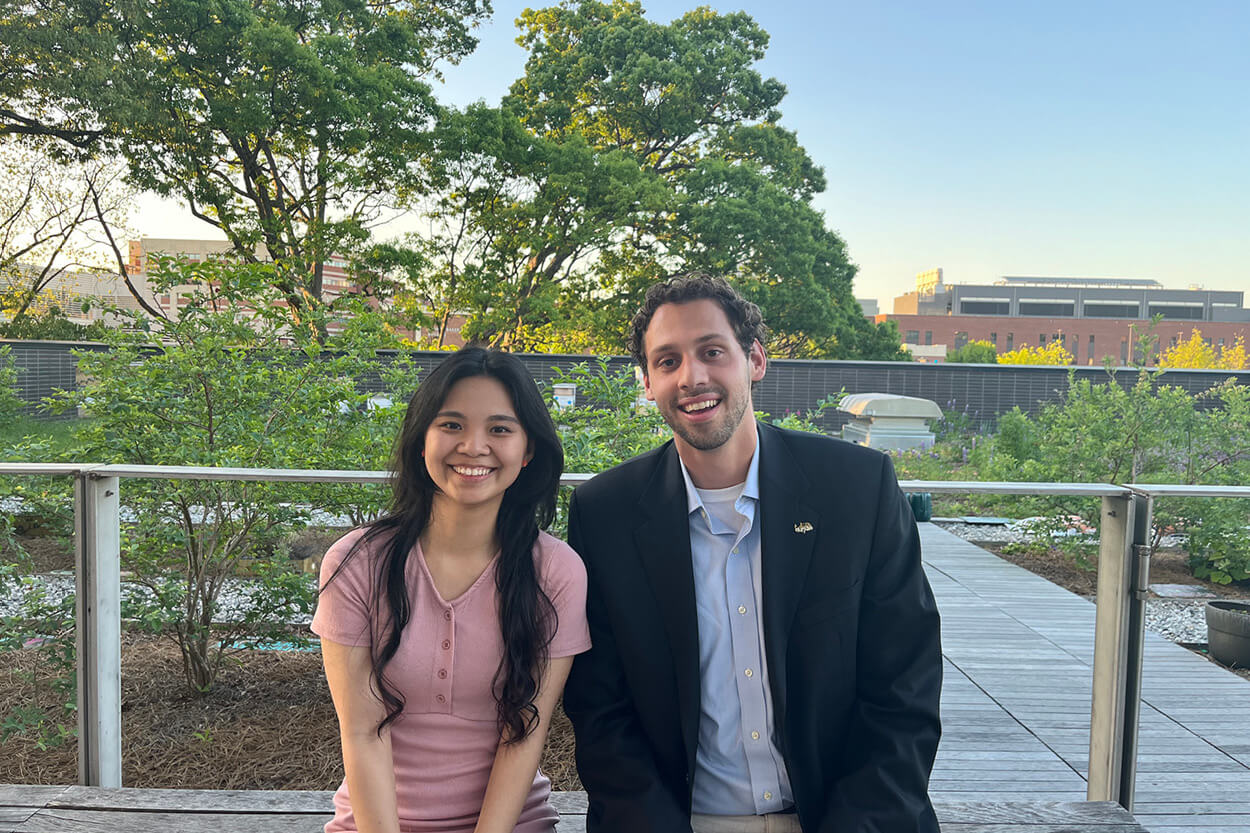
Find out how new Grad SGA leadership, Haden Boone and Kiera Tran, plan to bridge the gap and involve graduate students in important issues at Georgia Tech.
Engage the graduate student body. Communicate advocacy work. These are just a couple of the initiatives set forth by the Graduate Student Government Association’s (Grad SGA) new leadership.
Following an election in April, two Georgia Tech graduate students have hit the ground running in their newly elected leadership roles with Grad SGA. Haden Boone, president, and Kiera Tran, executive vice president, say that effective communication will be a key component to engage students during their tenure.
Boone, a Ph.D. student studying operations research in the School of Industrial and Systems Engineering, originally came to Georgia Tech for his undergrad in 2017.
“Upon my first visit to the Institute, it was hard not to fall in love with the campus, the culture, and most of all, the passionate innovation that drives so many of the students here,” said Boone. “I proceeded to spend six (so far) of the most important years of my life here.”
Kiera Tran is a Ph.D. student studying geophysical glaciology in the School of Earth and Atmospheric Sciences. She began her journey at Georgia Tech in her junior year of college. It was at Tech that Tran discovered her passion for earth science and the desire to make an impact on global issues.
“My senior year at Georgia Tech, I started to do research with my current advisor investigating the stability of glaciers in Antarctica,” said Tran. “By working in a supportive and opportunistic environment, I found myself unable to imagine spending another five years outside of Georgia Tech.”
Communication as a Catalyst for Change
The mission of Grad SGA’s executive branch is to serve as the voice of the student body. This requires two-way communication between Grad SGA and students, but Boone and Tran aren’t convinced that Grad SGA resonates with graduate students.
According to the two, most students regard Grad SGA as an organization that occasionally puts on events but does little to no advocacy work. To bridge this communication gap between students and Grad SGA, they plan to continue to advocate for solutions to important issues while remaining cognizant of the fact that solutions mean very little if they aren’t communicating the changes.
“Graduate students historically have a much harder time feeling connected to Georgia Tech, and I would like to do what I can to change that,” said Boone.
Outline of Goals
Boone and Tran outlined their primary challenges and potential solutions to address communication issues with three primary initiatives:
Consolidating and publicizing information.
Challenge: A common occurrence in our advocacy efforts is spending time creating and defending policies that help support graduate students only to find out that they already exist. Existing policies could be buried under many levels of documentation in the catalog or efforts to support mental health could be on an inaccessible page on our website.
Solution: Our goal is to create a better repository of this information and make sure graduate students are aware of the resources available to them in an easily digestible format.
Keeping students informed.
Challenge: Grad SGA does a lot of work protecting the interests of graduate students, but it’s unclear to the general population what our role is in these conversations.
Solution: The implementation of a newsletter and a better-maintained website will help legitimatize the organization to the student body, as well as encourage more graduate student involvement.
Soliciting student feedback.
Challenge: Our job as a student government is to represent the interests of our constituents. However, it is difficult to form a complete picture of student grievances when much of the population is not engaged in our work.
Solution: We plan to start at a high level by forming personal relationships with departmental Grad SGA leaders to uncover individual issues so that we can better represent the student body.
Outside of improving communication, Boone and Tran hope to accomplish the following goals during their time in Grad SGA leadership:
- Strengthen advisor-advisee relationships by developing a support system at the Institute level
- Address graduate student sequestration by expanding opportunities for students to socialize and expand their emotional support networks
- Support professional development by showcasing diverse career paths and leveraging the Georgia Tech Alumni network
- Improve access to campus services by developing short-term solutions for issues such as access to housing on campus, gym space, mental health/CARE services, and classroom space
- Establish dedicated committees for international and online graduate students to address the unique challenges faced by these student groups and connect them to resources and activities
- Contribute to the Climate Action Plan (CAP) by involving students in eco-friendly changes on campus and raising awareness about sustainability initiatives
“We have a great team pioneering quite a few new initiatives that we can’t wait to get started on in the fall,” said Boone and Tran.
If you have any further questions about these initiatives or suggestions for new initiatives, please reach out to Boone or Tran via their emails at jboone31@gatech.edu or ntran75@gatech.edu.